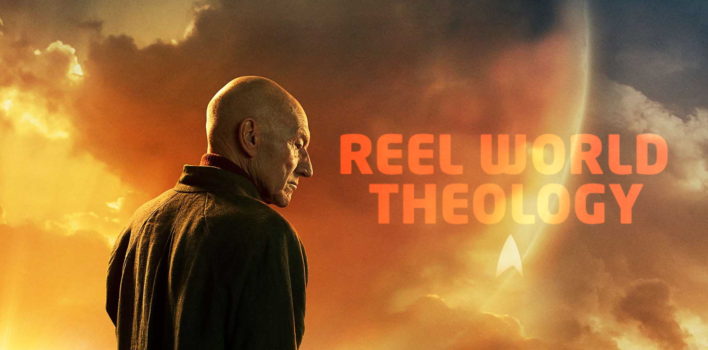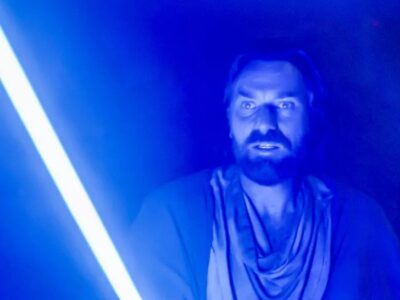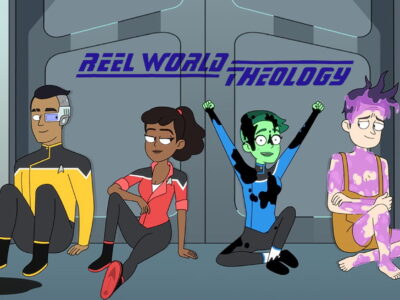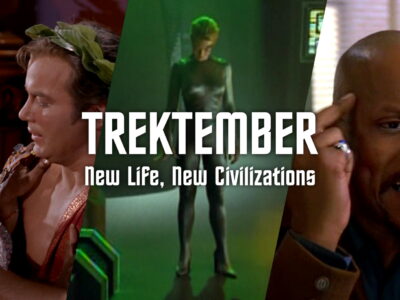“Maps and Legends” – Star Trek: Picard S1E02
Dr. Moritz Benayoun: You really want to go back out into the cold…knowing…
Jean-Luc Picard: More than ever, knowing.
—“Maps and Legends”
 In stories, there are two types of rest: a state of rest or calm, usually temporary, where a person is able to relax for a moment, “away from it all” until they fall back into the chaos; and a place of rest, where everything is pastoral and calm and relaxing even if the people inside are troubled or concerned. Characters in stories rarely have both, if either, for very long; at least until the end of their story.
In stories, there are two types of rest: a state of rest or calm, usually temporary, where a person is able to relax for a moment, “away from it all” until they fall back into the chaos; and a place of rest, where everything is pastoral and calm and relaxing even if the people inside are troubled or concerned. Characters in stories rarely have both, if either, for very long; at least until the end of their story.
Picard has been in a place of rest at Château Picard. Unfortunately, living in a place of rest without being restful takes its toll. Picard’s chaos may be coming back to him, but he ruefully tells Laris and Zhaban that he welcomes the opportunity to finally find a state of rest: “sitting here, all these years, nursing my offended dignity, writing books of history people prefer to forget. I never asked anything of myself—at all. […] I haven’t been living. I’ve been waiting to die.”
In “Maps and Legends,” this half-rest is well and truly over; he has left in pursuit of the truth.
Jean-Luc Picard: The Best of Us
As Mark noted during his review of last week’s episode, “Jean-Luc Picard is the most natural embodiment” of the Christian mission to live a loving and compassionate life; but I think he’s also one of the few embodiments of the mission of the United Federation of Planets.
 Think about all the times we saw Earth in the era of The Next Generation: when Picard visited in “Family,” after his assimilation, we saw his brother Robert not understanding Jean-Luc’s mission at all. In Deep Space Nine’s “Homefront,” we saw Earth in the grip of fear and panic at the coming Dominion threat. In almost every interaction Picard has with a flag officer, the Admiralty is shown to be fearful, ready to abandon all of the Federation’s dearest principles in the name of safety. In a very real way, in both our world and his, Picard is the best of us because he has a conscience that the rest of humanity doesn’t have, even in the far-flung future.
Think about all the times we saw Earth in the era of The Next Generation: when Picard visited in “Family,” after his assimilation, we saw his brother Robert not understanding Jean-Luc’s mission at all. In Deep Space Nine’s “Homefront,” we saw Earth in the grip of fear and panic at the coming Dominion threat. In almost every interaction Picard has with a flag officer, the Admiralty is shown to be fearful, ready to abandon all of the Federation’s dearest principles in the name of safety. In a very real way, in both our world and his, Picard is the best of us because he has a conscience that the rest of humanity doesn’t have, even in the far-flung future.
This is why Picard (the show) captivated me from day one. He is the same man he was all the way back in TNG’s “Measure of a Man;” and getting to see Picard as a rhetorical force to be reckoned with, advocating for a Federation that’s lost its conscience to do what’s right, is an exciting way to re-enter his life.
Yet even this great man has been relegated to a quiet retirement in La Barre, tending grapes and trying to stay far away from affairs of state. He’s at rest, but he’s not resting.
A Godly Rest
For a book that a lot of people assume is just a list of rules, the Bible actually talks a lot about rest. In fact, for God’s people throughout history, there has also been those same two types of rest as in stories: the state of rest and the place of rest.  And, like in stories, God’s people rarely if ever have both at the same time; they either face outer turmoil, inner chaos, or both. In many cases, God’s people are unclear about what that rest would even look like.
And, like in stories, God’s people rarely if ever have both at the same time; they either face outer turmoil, inner chaos, or both. In many cases, God’s people are unclear about what that rest would even look like.
Which is pretty understandable. “God’s rest,” as described in Hebrews 3 and 4, feels like a pretty high-concept idea; but it’s actually the whole reason the Israelites were called out of Egypt. See, God’s rest isn’t about sitting on the couch flipping channels; it’s a rest that finds itself wholly bought in and driven by God’s mission.
For God’s people, that mission is summed up in a promise by God in Genesis 12:
I will bless those who bless you, and him who dishonors you I will curse, and in you all the families of the earth shall be blessed.
—Genesis 12:3, ESV
God intended that His people would be a blessing to the world; but not, like, magically. He wanted to empower and work in them to be that blessing. In Jeremiah 29, he tells them about the plan in detail:
Thus says the Lord of hosts, the God of Israel, to all the exiles whom I have sent into exile from Jerusalem to Babylon: Build houses and live in them; plant gardens and eat their produce. Take wives and have sons and daughters; take wives for your sons, and give your daughters in marriage, that they may bear sons and daughters; multiply there, and do not decrease. But seek the welfare of the city where I have sent you into exile, and pray to the Lord on its behalf, for in its welfare you will find your welfare.
—Jeremiah 29:5-7, ESV
Godly rest is finding your welfare in the welfare of others. It’s seeking the good of others, even at risk to yourself. It’s being the first ones to help and the last ones to stop. It’s kind of like the purpose of the Federation; and like an Old Testament prophet, Picard has some strong words for a Starfleet that shirks that duty.
We withdrew. The galaxy was mourning, burying its dead, and Starfleet had slunk from its duties. The decision to call off the rescue and to abandon those people we had sworn to save was not just dishonorable, it was downright criminal. And I was not prepared to stand by and be a spectator.
—Picard, “Remembrance”
A Hardworking Rest
I was standing up for the Federation, for what it represents, for what it should still represent.
—Picard, “Maps and Legends”
 As Picard ventures back into the stars after fourteen years, he’s stepping back into the mission that he dedicated his life to; the mission that he turned his back on Starfleet for abandoning. I think we’re in for some great Picard speeches, but it all begins here: with a call to a rest that seeks the good of every sentient being in the galaxy.
As Picard ventures back into the stars after fourteen years, he’s stepping back into the mission that he dedicated his life to; the mission that he turned his back on Starfleet for abandoning. I think we’re in for some great Picard speeches, but it all begins here: with a call to a rest that seeks the good of every sentient being in the galaxy.
Our mission is much more local—but no less crucial. What words would Picard (and, indeed, God himself) have about the way you rest? About the way you work for the good of others? About the way you seek your own welfare?
God has made and chosen His people for this purpose; and with Picard getting back to his purpose, I hope we’ll get back to ours.
• • •
Craving more Star Trek content? We do a whole month on the franchise every September; click here to warp over to Trektember. And don’t forget to drop in next week for our review of Season 1, Episode 3.








Pingback: “Absolute Candor” – Star Trek: Picard S1E04 | Reel World Theology